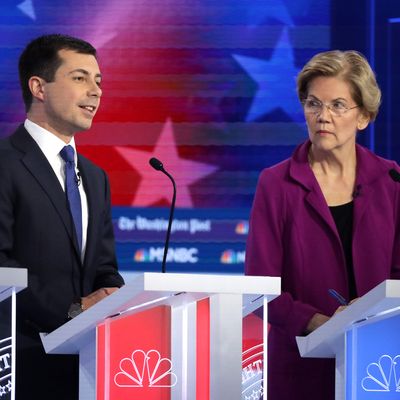
Yep, there’s another Democratic debate happening tonight. Will it be any more exciting than the humdrum edition in November? I spoke with national political correspondent Gabriel Debenedetti about what to expect.
Ben: Impeachment is again overshadowing a Democratic debate. To what extent do you think the drama in Washington will color what happens onstage? During the last debate, it felt like the candidates, not just the viewers, were kind of pre-exhausted from the endless onslaught of news.
Gabriel: One of the big things that the candidates and the moderators have been grappling with for the last few months is how to talk about all this on the debate stage — the candidates broadly agree on the general topic of impeachment, and Trump’s demonstrated lack of fitness for office. But do TV networks really want their debates to be two hours of candidates agreeing with each other, even if it’s about the most important thing going on, by far? Of course not. It’s not as simple as “So we’ll talk about something else …!” though. The candidates will want to discuss all this as a way to get into why they’re the one who is best positioned to beat Trump, since that’s what voters care about most. So I wouldn’t expect to hear much narrow talk specifically about impeachment, but there will probably be plenty of allusions to it as the candidates frame their pitches.
Ben: Just before we get into yet another 45-minute debate about the merits of true Medicare for All versus a public option.
Gabriel: Yeah, and implementation windows.
Ben: Who could forget those?
Gabriel: In reality, this is kind of the existential problem for the primary debates this year. The candidates haven’t really figured out an extremely effective way to convince people all this matters as much in the extreme short term as the daily D.C. morass.
Ben: It doesn’t help that the primary process is three years long.
Gabriel: Did I ever tell you about how on the morning of November 9, 2016, a top Clinton donor called me to try floating his favored options for 2020?
Ben: You did not.
Gabriel: That’s basically the whole story. He wanted Terry McAuliffe to run. I was a bit busy writing about, well, not that.
Ben: As they say, read the room.
Gabriel: Point being, the primaries never end because they never start because they never end …
Ben: I seem to ask before every debate whether we’re primed to witness a major clash between two top-tier candidates, and then it usually doesn’t happen. This time around, perhaps the two most likely to quarrel are Elizabeth Warren and Pete Buttigieg, who have been sparring for weeks, over transparency, the role (or lack thereof) of big donors in their campaign, and more. Would it benefit either of them to go after the other in a memorable way tonight?
Gabriel: We always think we know who’s going to go after whom, and then it doesn’t happen, right? As I wrote about earlier this week, the really interesting dynamic that campaigns are struggling with now is Bernie Sanders’s staying power and the fact that none of them have attacked him in any sustained way, and now they don’t know how, or if it’s too late to try. I’d be pretty surprised if any of the other top candidates try going after him, but sure, it seems fair to assume Warren and Buttigieg will at least be set up to clash by some questions, given the way the last few weeks have unfolded. But the only sure bet, I think, is that Amy Klobuchar tries getting in on some fights — either with Warren or Buttigieg, or maybe (maaaaaybe) Sanders.
Ben: She is often written about as a dark horse, though her poll numbers have remained fairly anemic. She did have a solid debate last time around, though.
Gabriel: She’s been declared a “winner” by pundits in every single debate so far. So.
Ben: Her polls have ticked up a bit, no?
Gabriel: Sure, yes, in Iowa specifically there’s clearly some new interest in her, which is undoubtedly coming exactly when she wants it to.
Ben: What about Tom Steyer? Why is he there again?
Gabriel: The question with Steyer, but also Klobuchar, and Andrew Yang, is whether they can figure out a way tonight to convince enough people to think of them as serious contenders in the way the Top Four have. If the debate feels like it’s basically split into two groups — Biden, Sanders, Warren, Buttigieg … oh, and also Klobuchar, Steyer, and Yang — they’ll have failed. But it’s hard to tell how high the stakes really are at this point. I mean, there’s still another debate before Iowa, and voters are notoriously tuned out over the holiday season.
Ben: This sense of inertia would seem to benefit the front-runner, Joe Biden. His lead, in national if not early-state polls, continues to be steady, and as you’ve said before, candidates who have gone after him directly haven’t fared so well in the aftermath. So he’s probably cool with the status quo, right?
Gabriel: Sure! He’s winning! I don’t think he’d complain if Warren stumbled a bit more, but it’s not like he has any clear incentive to go out of his way to make that happen, given the high risk of trying it.





























